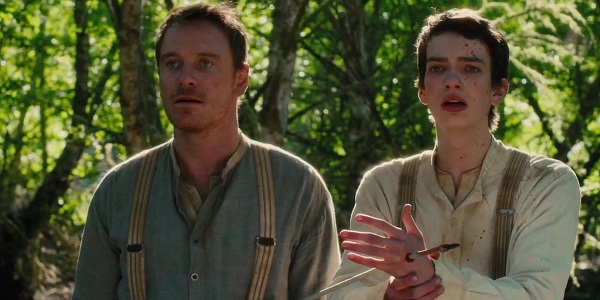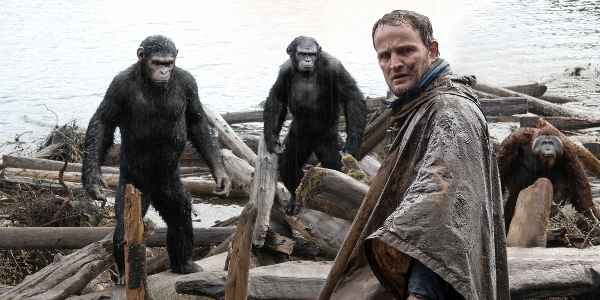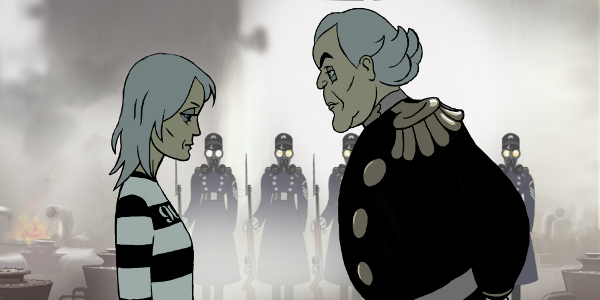Slow West (2015)
July 5, 2015 Leave a comment
 When an incident back home forces the girl of his adolescent dreams to flee to America, naive 16-year-old Scotsman Jay Cavendish (Kodi Smit-McPhee) sets off in hot pursuit. Little does he realise that Rose (Caren Pistorius) and her father (Rory McCann) have a large price on their heads, and that in his youthful innocence-cum-ignorance he is inadvertently leading a parade of bounty hunters right to them. Interested parties include Silas Selleck (Michael Fassbender), an Irish immigrant who sells his services to Jay in the supposed spirit of camaraderie; Payne (Ben Mendelsohn), a gang-leader and alpha-hunter who has a history with Silas; and Angus the Clergyman (Tony Croft), a lone mercenary who assumes the identity of a holy man to wrong-foot his prey. As they draw closer to their respective prizes, however, Silas begins to admire Jay’s courage and determination.
When an incident back home forces the girl of his adolescent dreams to flee to America, naive 16-year-old Scotsman Jay Cavendish (Kodi Smit-McPhee) sets off in hot pursuit. Little does he realise that Rose (Caren Pistorius) and her father (Rory McCann) have a large price on their heads, and that in his youthful innocence-cum-ignorance he is inadvertently leading a parade of bounty hunters right to them. Interested parties include Silas Selleck (Michael Fassbender), an Irish immigrant who sells his services to Jay in the supposed spirit of camaraderie; Payne (Ben Mendelsohn), a gang-leader and alpha-hunter who has a history with Silas; and Angus the Clergyman (Tony Croft), a lone mercenary who assumes the identity of a holy man to wrong-foot his prey. As they draw closer to their respective prizes, however, Silas begins to admire Jay’s courage and determination.
Of all cinema’s assorted genres and subgenres, it’s perhaps the Western that is the most divisive among cinephiles, at least behind horror. Either you can relate to the perennial nameless wanderer — a personification of tumbleweed both bow-legged and squinty-eyed — or you can’t; and if not then the Old West is invariably a barren and inhospitable place populated by characters that you find it next to impossible to engage with. Thankfully, as is often the case in the multiplex medium of film, there are exceptions, and John Maclean’s Slow West is undoubtedly one of the most exceptional of all. After all, this is a Western with a Scottish protagonist, a comedic undercurrent and strong female character — it’s about as far removed from the blanched American desert and staunch individualism that usually characterises this kind of movie as it is possible to get. There isn’t a single sheriff, deputy or Mexican in the entire movie.
Some have described the absurdist tonal elements as decidedly and distinctly Coen-esque, but while the brothers might well have been an influence Slow West goes well beyond the likes of No Country For Old Men and True Grit in reconciling its tragicomic sensibilities. These are complex, compelling and (most unusually) coherent characters who just happen to be companionable, too. Rather than get caught up in race-relations and other issues of American culture Maclean takes a refreshingly European view of the whole set-up, having Jay and Rose themselves take a more sympathetic stance towards the natives and other immigrants. This new perspective and fresh approach lends the film a novelty that precious few Westerns can lay claim to, particularly in its treatment of women and ethnic minorities. We have in recent years seen the genre transplanted to the American outback in films such as The Proposition and The Rover, but this really is our first exposure to a British or specifically Scottish Western (Maclean hails from Tayside).
To praise the film for possessing such wit, however, is not to suggest that it’s not without acuity or gravitas too, as a gut-wrenchingly unforgiving visit to a trading post during the film’s second act unmistakably proves. Whereas most Westerns glorify violence through prolongued shoot-outs and protracted death throes, the often ruthlessly unsentimental Slow West focuses instead on the immediacy and inglory of death. Lives are ended, potential is squandered and children are orphaned, while the killers themselves are rarely spared their just deserts. The film ends with a strikingly silent and senseless montage, revisiting the trail of dead bodies left by Jay and Silas as they lie motionless across 19th Century Colorado. Earlier in the film, Jay asks an apparently friendly anthropoligist if he minds sharing his fire with a murderer, to which the ethnographer replies that he wouldn’t have many visitors if he did. The film subtly but succinctly outlines the harsh and sometimes inhuman realities of colonialism, and arguably serves to criticise both contemporary American foreign policy and its questionable gun laws at the same time.
Throw in one of cinema’s more convincing Scottish accents (pronounced to perfection by the impeccable Smit-McPhee) and the spectacle of seeing two men in long-johns drying their laundry on a line strung between two horses (complete with comedy call-back) and you have one of the most accessible and pleasantly surprising Westerns to date. And to think, I was all too ready to derisively dub it Slowest.








